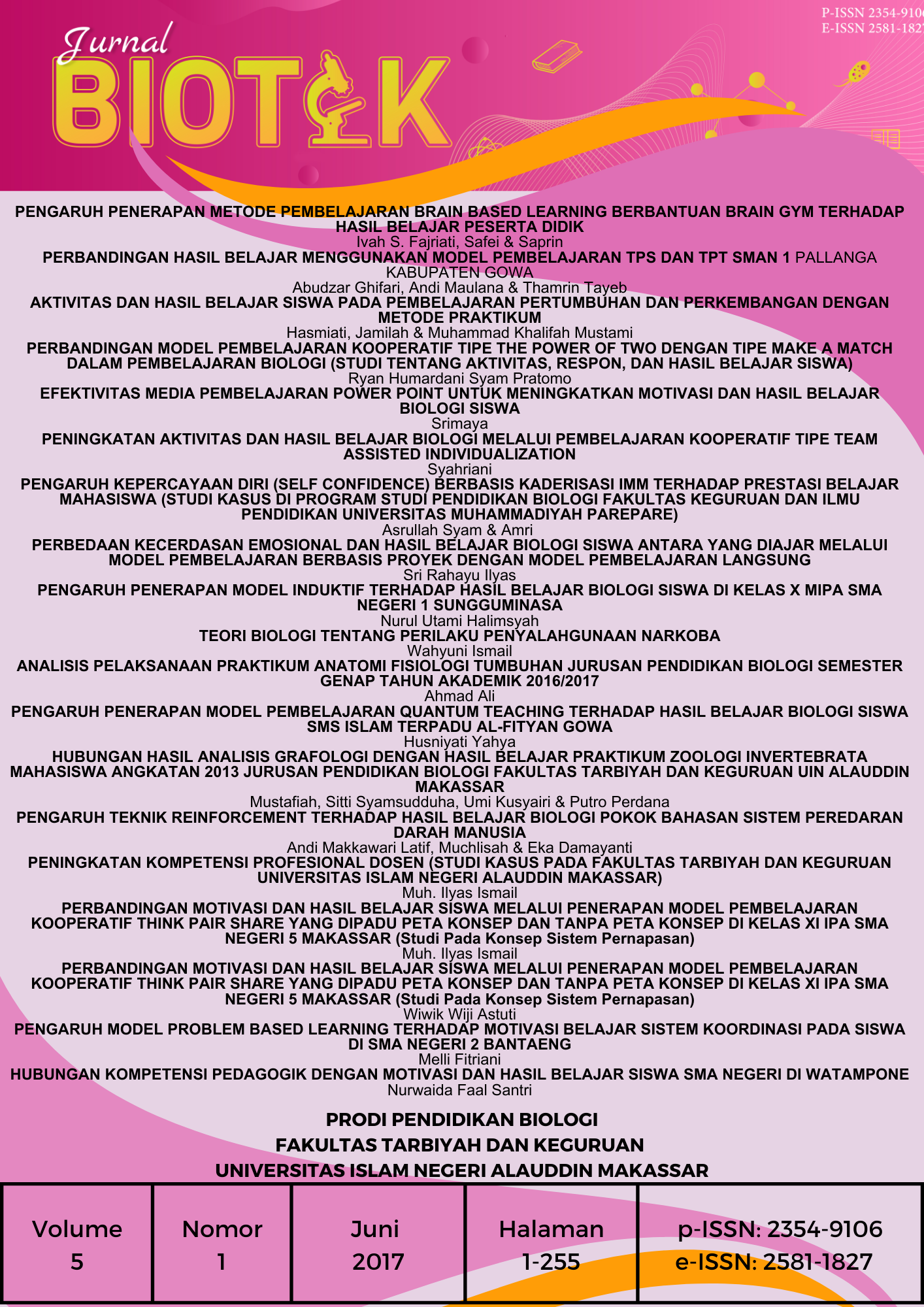PERBANDINGAN MODEL PEMBELAJARAN KOOPERATIF TIPE THE POWER OF TWO DENGAN TIPE MAKE A MATCH DALAM PEMBELAJARAN BIOLOGI (STUDI TENTANG AKTIVITAS, RESPON, DAN HASIL BELAJAR SISWA)
Abstract
This research is aimed at: (i) identifying the difference of students’ activity at grade IX of SMPN 1 Sungguminasa who were taught using cooperative learning type the power of two and type make a match (ii) finding the difference of students’ response at grade IX of SMPN 1 Sungguminasa who were taught by using cooperative learning of type the power of two and type make a match (iii) discovering the difference of students’ learning outcome at grade IX of SMPN 1 Sungguminasa who were taught by using cooperative learning of type the power of two and type make a match. Type of this research is quasi experiment that was conducted at SMPN 1 Sungguminasa. There were two group of experiment involved on this research; those are group experiment I who were taught by using cooperative learning type of the power of two and group experiment II who were taught by using cooperative learning type make a match. Instrument of the research include observation sheet of activities to know the students’ activities, questionnaire to discover students’ response on the learning activities, learning outcomes test to obtain data the learning outcomes of the subject Human Survival. The data were than analyzed descriptively and inferentially (t-test with α = 0.05) by the assist of SPSS 15.0 for windows. The result indicates that: (i) there is no significant difference between activities of students who were taught by using cooperative learning type the power of two and type make a match, (ii) there is no significant difference between responses of students who were taught by using cooperative learning type the power of two and type make a match, and (iii) there is no significant difference between learning outcomes of students who were taught by using cooperative learning type the power of two and type make a match.
Downloads
References
Badan Standar Nasional Pendidikan, (2007). Panduan penilaian Kelompok Mata Pelajaran Ilmu Pengetahuan Alam dan Tekhnologi. Jakarta: Depdiknas.
Batari, T.U. (2010). Peningkatan Kemampuan Membaca Permulaan Siswa Kelas 1 SD Inpres Lambengi Kec.Pallangga Kabupaten Gowa Melalui Penerapan Model Make a Match Pada Pembelajaran Tematik. Tesis. Tidak diterbitkan. Universitas Negeri Makassar.
Fuhasari, H. (2012) Peningkatan Hasil Belajar IPA dengan Menerapkan Metode The Power of Two pada Siswa Kelas IV SD Negeri Trangsan 03 Gatak Sukoharjo Tahun Ajaran 2011/2012. Jurnal Pendidikan, (Online), (http://www.ums.ac.id, Diakses 28 Mei 2015).
Isjoni. (2011). Cooperative Learning. Efektifitas Pembelajaran Kelompok. Bandung: Alfabeta.
Poppy, K.D. (2007). Model Pembelajaran Kooperatif untuk Guru SD, SMP dan SMA. Bandung. P4TK IPA Depdiknas.
Purwanto. (2009). Evaluasi Hasil Belajar. Yogyakarta: Pustaka Pelajar.
Ramadhan, T. (2009). Pembelajaran Kooperatif “Make a Match”. (Online). (Http://Tarmizi.Worddpress.Com, Diakses 12 september 2015).
Silberman. (2009). Pembelajaran The Power of Two, (Online). (http://www.scribd.com /doc31286550/Pembelajaran-the-Power-of-Two.Diakses,3 September 2015).
Sugiyono. (2012). Statistika untuk Penelitian. Bandung: Alfabeta.
Suharsimi, A. (2005). Dasar-Dasar Evaluasi Pendidikan (Edisi Revisi) Cetakan Kelima. Jakarta: Bumi Aksara.
Suprijono, A. (2012). Cooperative Learning Teori dan Aplikasi PAIKEM. Yogyakarta: Pustaka Pelajar.
Indahwati, N. (2009). Penerapan Pembelajaran Kooperatif Metode Make a match Untuk Meningkatkan Aktivitas dan Hasil Belajar Siswa Kelas XI IPS pada Mata Pelajaran Akuntansi Pokok Bahasan Jurnal Umum di SMA Kertanegara Malang. Jurnal Pendidikan, (Online), (http://www.um.ac.id, Diakses 28 Mei 2014).
Authors who publish with Jurnal Biotek agree to the following terms: Authors retain the copyright and grant Universitas Islam Negeri Alauddin Makassar right of first publication with the work simultaneously licensed under a Creative Commons Attribution License (CC BY-SA 4.0) that allows others to share (copy and redistribute the material in any medium or format) and adapt (remix, transform, and build upon the material) the work for any purpose, even commercially with an acknowledgement of the work's authorship and initial publication in Universitas Islam Negeri Alauddin Makassar. Authors are able to enter into separate, additional contractual arrangements for the non-exclusive distribution of the journal's published version of the work (e.g., post it to an institutional repository or publish it in a book), with an acknowledgement of its initial publication in Universitas Islam Negeri Alauddin Makassar. Authors are permitted and encouraged to post their work online (e.g., in institutional repositories or on their website) prior to and during the submission process, as it can lead to productive exchanges, as well as earlier and greater citation of published work (See The Effect of Open Access).

This work is licensed under a Creative Commons Attribution-ShareAlike 4.0 International License.



